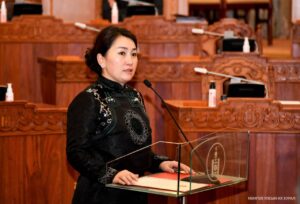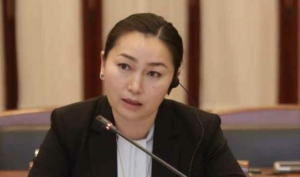
In three months, the Mongolian Parliament will almost double the number of its members – from 76 to 126. Following the new law, 48 of the total will be elected through a closed proportional list, composed, another first, by alternating female and male candidates. In this way, women will hold at least an equal percentage of this quota. «Something unforeseen before», confirms Bulgantuya Khurelbaatar, the Mongolian Minister for Labour and Social Protection. In the only previous experiment of proportional lists, «in 2012, pretty much all the women were listed at the bottom».
Alley Oop had had the opportunity to speak to the Minister, who entered her current role in early 2023. An economist, Bulgantuya Khurelbaatar studied in China and the Usa, at Yale, before starting a career in the private sector. She was appointed Deputy Minister for Finance from 2016 to 2020. We spoke about the country’s situation, focusing in particular on gender equality, a topic, she highlights, the Government has given great importance to. «In a country of 3.4 million people, in which 1/3 of the population is under the age of 18, the number of people in labour-age is slim. This means that we especially need to empower women to be effective contributors to society, not only having and caring for children. But also being an important economic and social contributor».
Women’s participation in the labour market
According to the Minister, efforts to boost women’s participation have not always been successful, even with rising attention to the topic. «During the Soviet era, the labour participation of men and women was equal. There was almost no such concept of even a housewife. Everybody was urged and supported to work.» Thanks to different safety networks and systems, women could start working right after having a baby. But «Since the 2010s, when we were going through the economic transition, from a planned economy to a market economy and democracy. We had difficulties in investing, especially in schools and kinder gardens. As a result (more) women were unable to work.»
A decline in female labour participation also brought a decline in women’s presence at decision-making levels. «After 30 years down the democratic and market economy paths, we realized there have to be policies to ensure that women are not left behind. We are a sandwich (country) between China and Russia, the world’s biggest population. So, there is an urgent need for population development and for women to be significant contributors to society.» Special attention has been given to female presence in Parliament. For example, in 2012, a 20% gender quota was introduced, extended to 30% this year, which will increase to 40% in 2028.
«An amazing progress – she confirms – in such a short amount of time, has been possible (thanks to) a number of our development partners.» And thanks to the political power’s will– mostly men. From «the prime Minister, the chairmen of the super-majority party, the Mongolian People’s Party, – a strong supporter of gender equality. The secretary general of the party, the speaker of the Parliament, the president…»
Gender equality in a nomadic culture
Bulgantuya Khurelbaatar explains how «in Mongolia, a nomadic country, the sense of freedom, the sense of gender equality, is embedded in the culture. It is in our blood. Mongolia ranks quite high in terms of gender development. But the country’s gender inequality index is below the regional and global average.» Moreover, «around 58% of women have experienced physical, sexual, emotional or economic violence and controlling behaviours by their intimate partner at least once.» With economic dependence playing a significant role.
 «Where there is a professional career gap, when women don’t have their income, they are easily vulnerable to various abuse.» The case also in Mongolia, where women are well educated (representing 60% of college students.) «Traditionally, if a family has a choice, they usually send their daughters to college. Boys inherit the family’s assets. Women are encouraged to get a higher education so they can make a living for themselves – and marry men who are higher educated as well». However, the limits to better opportunities for Mongolian women she offers are to be found even in the country’s structures.
«Where there is a professional career gap, when women don’t have their income, they are easily vulnerable to various abuse.» The case also in Mongolia, where women are well educated (representing 60% of college students.) «Traditionally, if a family has a choice, they usually send their daughters to college. Boys inherit the family’s assets. Women are encouraged to get a higher education so they can make a living for themselves – and marry men who are higher educated as well». However, the limits to better opportunities for Mongolian women she offers are to be found even in the country’s structures.
«Half of our population resides in the capital city. The coldest capital in the world. Due to a small availability of infrastructure, there is a lot of congestion, and the city has become one of the most polluted in the world.» Structural weaknesses that directly influence women’s careers and empowerment and put a further strain on them. But that could be eased, the Minister suggests, through «Flexible working hours, significant investment into healthcare and in decreasing pollution of Ulaanbaatar».
Current plans and future actions
In this respect, some plans have been implemented, moving, for example, from the loosely regulated home-working arrangements to the «new labour code, which stipulates the possibility to work from home, online, and with flexible hours. This is especially important for women with young children. The birth rate in Mongolia is quite good, but at the same time, like everywhere in the world, it is usually the mother who takes time off when there is any issue at home.» Nonetheless, the change does not seem to be happening fast. «We have quite high rates of women obtaining high education, but still, the average salary difference between men and women reaches almost 20%. Women have difficulty consistently having a career. They do enter the workforce, but especially at the lower levels. At mid-levels (their presence) becomes quite scarce. And there are mostly men» in the top positions.
As it happens elsewhere, «the higher (on the career ladder) you get, the more severe competition becomes. And unless there is a policy in place, businesses, politics, and governments would rather promote men. To ensure that there are more women, especially at the government level and within the Government-appointed positions, we have a law on the promotion of gender equality and a national program on gender equality. But, to tell you the truth, this is still not well implemented. And looking at the gender social norms, approximately half the population perceives men as better political leaders and better leaders overall».
The election and beyond
Besides an increased number of members, the upcoming elections will enlarge the voting districts. «This year, we are putting 3 or 4 provinces together. Making each one very big» But since sometimes the larger the population, the more difficult it becomes for women candidates, «we have taken actions to lower the costs of the election, the number of staff that you can hire (now it is twice as less as it was) and how much we can pay them. So that it doesn’t become that who can pay the most, ultimately wins».
With money playing a significant role in entering the electoral campaigns, women candidates face another big challenge; «social media, and media at large. They can be very brutal towards female politicians. Especially at the decision-making level, they hold such high standards that discourage many women from entering politics. Also, the media gets swung by money, and for money, sometimes, one can have anything written. It has been quite difficult in this new age of social media and our new election landscape to manoeuvre ourselves in such a large population and within such a large number of candidates».
In a similar scenario, the Minister confirms, education is crucial. «I have seen that work experience and education do play a very important role. Electors can be quite forgiving or even very supportive of women who have experience. This is one reason, especially at the grassroots level and the local elections within, even at the smallest administration unit, women can be easily elected. They work closely with their grassroots organizations and with the people. And even though we have the minimum 20% quotas and only 17% women were seated in the Parliament during the last elections, over 30% of local parliament members are women».
In June, «We estimate we will elect around 39 women. And with the 2028 elections, with 40% of the candidates, we will see even more» in the Parliament. Relevant numbers are also for Mongolian effective development. With more women elected, «in the last 12 years, we have seen increased investments in education, social protection policies, and even hard infrastructure». Yet she does not hide that «Unfortunately, when things like children’s rights are breached, in case of child abuse, usually the women parliamentarian are held responsible.» It is as if, she points out, «17% of the Parliament is responsible for 67% of the population. We are asking for not better rights than men, just equal rights».
At the end of our exchange, Bulgantuya Khurelbaatar positively remarked on the European example: «We are thankful for the Western countries that are making progress on that front. We can hold your examples as a flagship and go forward. Unfortunately, we haven’t had a female president yet…»
***
Alley Oop’s newsletter
Every Friday morning Alley Oop arrives in your inbox with news and stories. To sign up, click here.
If you want to write to or contact Alley Oop’s editorial team, email us at alleyoop@ilsole24ore.com.